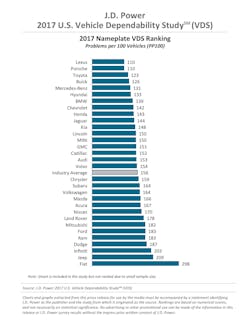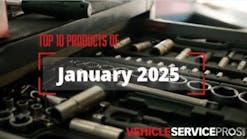2017 Vehicle Dependability Study released; Lexus tops list for sixth consecutive year
While Lexus and Porsche nameplates lead the industry in vehicle dependability, owners of many high-volume vehicles are also rewarded with excellent long-term quality, according to the J.D. Power 2017 Vehicle Dependability Study (VDS).
The study, now in its 28th year, examines problems experienced during the past 12 months by original owners of 2014 model-year vehicles. Overall dependability is determined by the number of problems experienced per 100 vehicles (PP100), with a lower score reflecting higher quality. The study covers 177 specific problems grouped into eight major vehicle categories.
The study finds that the 10 top-selling 2014 model-year vehicles average 134 PP100, which is significantly better than the industry average of 156 PP100. Two perennial best sellers—the Ford F-150 and the Toyota Camry—also lead their segments in the VDS this year.
“We find buyers are increasingly avoiding models with poor reputations for dependability, so manufacturers can’t afford to let quality slip, particularly on their best sellers,” said Dave Sargent, vice president, global automotive at J.D. Power. “While many expensive and niche vehicles do have excellent quality, the fact is that most consumers are shopping in the high-volume mainstream segments. The good news is that consumers don’t have to spend a lot of money to get a very dependable vehicle.”
J.D. Power finds that in addition to impacting purchase decisions and brand loyalty, better long-term quality is a key factor in contributing to higher residual values for vehicles. For example, J.D. Power estimates that Toyota—the highest-ranked non-premium brand in the study—has a residual values benefit of more than $750 per vehicle, compared with the average brand. This translates into a benefit of more than $1.3 billion for the 2014 model year alone.
“In the current industry environment of record levels of leasing and long-term loans, higher residual values allow automakers to provide more competitive deals to buyers,” said Jonathan Banks, vice president of vehicle analysis and analytics at J.D. Power. “This creates the opportunity to achieve higher market share and/or elevated profit margins.”
Highest-Ranked Nameplates and Models
Lexus and Porsche tie to rank highest in vehicle dependability among all nameplates, with a score of 110 PP100. This is the sixth consecutive year of Lexus topping the nameplate rankings in the VDS.
- Toyota (123 PP100) follows in the rankings, moving up one rank position from 2016.
- Following Toyota in the rankings are Buick (126 PP100) and Mercedes-Benz (131 PP100).
- Hyundai (133 PP100) is the most improved nameplate in the study, improving by 25 PP100 from 2016. At sixth position (up from 19th in 2016), this is Hyundai’s best-ever ranking in the VDS.
- Other notable improvements include Dodge and Ford, which both improve by 21 PP100 from 2016, and Land Rover, which improves by 20 PP100.
Toyota Motor Corporation models receive 10 of the 18 segment awards, representing the highest number of awards ever received by an individual corporation in the study. These awardees are Lexus ES; Lexus GS; Lexus RX; Toyota Avalon; Toyota Camry; Toyota FJ Cruiser; Toyota Prius; Toyota Prius v; Toyota Sienna; and Toyota Venza. The Toyota Camry has the lowest PP100 score industry-wide.
General Motors models receive four segment awards for the Chevrolet Camaro; Chevrolet Sonic; Chevrolet Silverado HD; and Chevrolet Tahoe.
Other models receiving segment awards in the study are the Ford F-150; Honda Ridgeline; Mercedes-Benz GLK-Class; and Volkswagen Tiguan.
Other Key Findings
- Continuing increases in technology-related problems have contributed to dependability worsening in the industry for a second consecutive year. The industry average of 156 PP100 is a 4 PP100 increase from 2016.
- The Audio/Communication/Entertainment/Navigation (ACEN) category continues to be the most problematic area, accounting for 22% of all problems reported—up from 20% last year.
- For a third consecutive year, the problems most reported by owners are Bluetooth pairing/connectivity and built-in voice recognition misinterpreting commands.
- New to the top 10 list of problems reported in 2017 is battery failure. In fact, 44% more owners report a battery failure this year than in 2016. Batteries are the most frequently replaced component not related to normal wear and tear in 3-year-old vehicles at 6.1%—up 1.3 percentage points from 2016.
The 2017 U.S. Vehicle Dependability Study is based on responses from 35,186 original owners of 2014 model-year vehicles after three years of ownership. The study was fielded from October through December 2016.
Find more detailed information on vehicle dependability, as well as model photos and specs, at www.jdpower.com/dependability.


